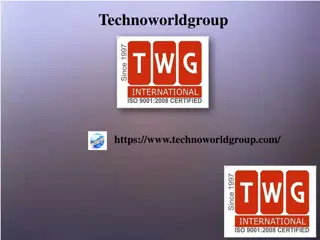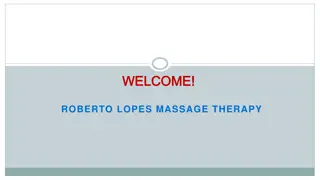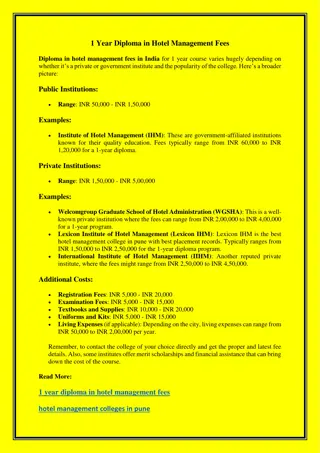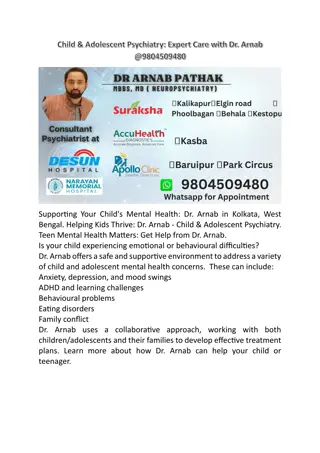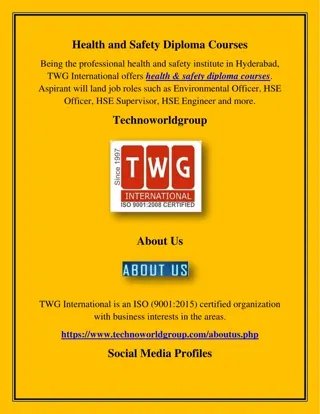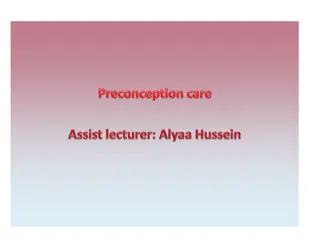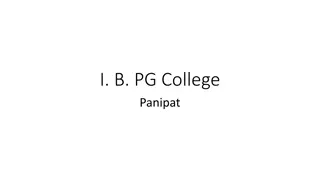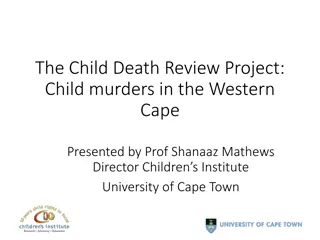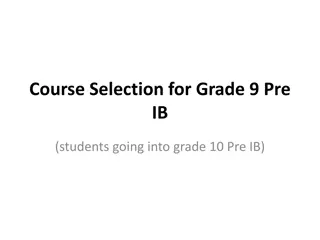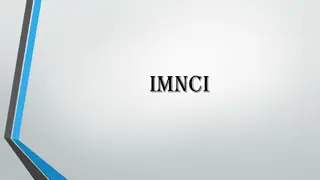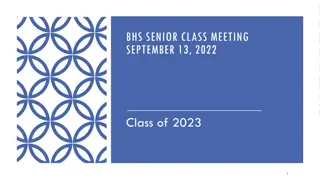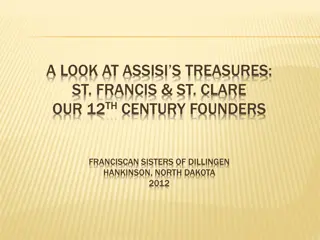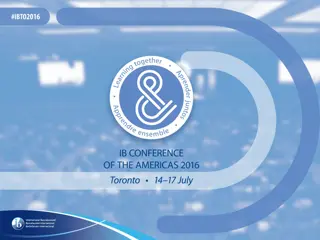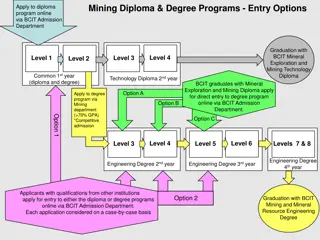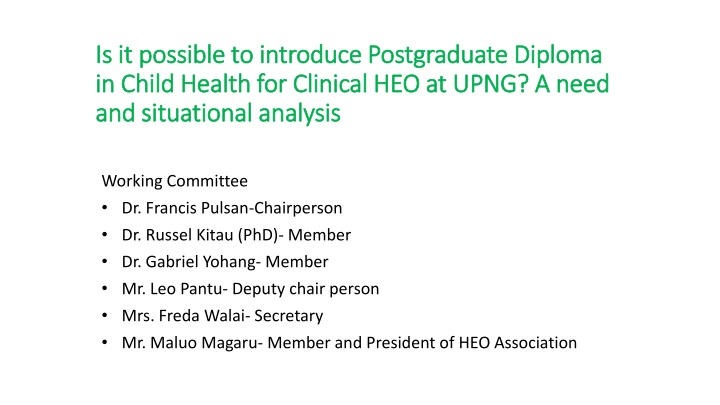
Postgraduate Diploma in Child Health for Clinical HEO at UPNG
Explore the need for a Postgraduate Diploma in Child Health for Clinical Health Extension Officers (HEO) at UPNG, aiming to address child health challenges and enhance service delivery in Papua New Guinea through specialized training. The initiative is backed by a dedicated working committee and aims to reduce child mortality, meet national health goals, and strengthen healthcare workforce capacity in pediatric care.
Download Presentation

Please find below an Image/Link to download the presentation.
The content on the website is provided AS IS for your information and personal use only. It may not be sold, licensed, or shared on other websites without obtaining consent from the author. If you encounter any issues during the download, it is possible that the publisher has removed the file from their server.
You are allowed to download the files provided on this website for personal or commercial use, subject to the condition that they are used lawfully. All files are the property of their respective owners.
The content on the website is provided AS IS for your information and personal use only. It may not be sold, licensed, or shared on other websites without obtaining consent from the author.
E N D
Presentation Transcript
Is it possible to introduce Postgraduate Diploma Is it possible to introduce Postgraduate Diploma in Child Health for Clinical HEO at UPNG? A need in Child Health for Clinical HEO at UPNG? A need and situational analysis and situational analysis Working Committee Dr. Francis Pulsan-Chairperson Dr. Russel Kitau (PhD)- Member Dr. Gabriel Yohang- Member Mr. Leo Pantu- Deputy chair person Mrs. Freda Walai- Secretary Mr. Maluo Magaru- Member and President of HEO Association
Past and current HEO training Past and current HEO training 1961- Papuan Medical College (medical assistant) 1967- Paramedical College/CAHS (HEO) Recently- DWU- Rural Health programme General diagnosis and treatment of illnesses in adults and children Particular emphasis on health improvement programs Administrative functions of a health center
Number of HEOs to date Number of HEOs to date Total of >589 Administrative positions (160) Clinical HEOs (422) Of the 422 clinical HEOs, 226 in rural health facilities and 196 working in hospitals Of the 196 hospital base clinical HEOs, on average 2 are working in each pediatric department So, the total pediatric clinical HEOs are 44
Recognizing HEO contribution to Child Health Recognizing HEO contribution to Child Health HEOs played a huge role in caring for sick children and child health programs Pediatricians noticed that HEOs have been manning pediatric wards and managing sick children in the hospitals (both rural and provincial) where there were no pediatric medical officers and pediatricians Talk started. Madang Symposium in 2018 and Sogeri Mid year symposium in 2022
Why is PGDCH for Clinical HEO important? Why is PGDCH for Clinical HEO important? Reducing child mortality and morbidity. NHP Goal/SDG Goal Meeting the Child Health National Health Plan and Policy 2021- 2030 Service training of the pediatric health workforce Improved and strengthening service delivery to the communities
Situational Analysis Situational Analysis Strengths Academics to coordinate the program Pediatricians to supervise (> 30 pediatricians) Hospitals to do training (PMGH and provincial hospitals) Training resources (text books, lectures, patients, etc.) Weakness Funding to support the program
Partners and actors Partners and actors University of Papua New Guinea accepting and run the program PNG pediatric Society- Health workforce training Provincial Health Authorities- Training venue and funding support for candidates Port Moresby General Hospital- Training venue HEO Association- Salary inclusion in their award Candidates- Acquire skills and knowledge about Child Health Patients- Important training resource
Assumption and risks Assumption and risks UPNG resistance to accept the program UPNG have no funding to support the program PHAs may not provide support funding for the candidates Candidates may not wanting to study Pediatricians may not provide utmost support and training because of workload Higher certificate may not be recognized in HEO award/DPM Divine Word University. What will they think??
Propose HEO post graduate training Propose HEO post graduate training PNG DHERST, Postgraduate Diploma in Child Health-categorized as Level 8 The program will be conducted at the SMHS, UPNG Is aimed at clinical HEOs Learning in a mixture of asynchronous and remote synchronous and face to face delivery of concepts Candidates will need to attend taught sessions in PMGH before the exams
Entry requirements Entry requirements Professional requirements Fully registered HEOs Practitioners in PNG with at least 2 years work as a fully registered HEOs Practitioner in Child Health E Expected academic standard xpected academic standard Candidates are expected to hold At least Diploma or Bachelor s degree in Allied Health Sciences (Rural Health) program or equivalent from DWU or equivalent standard from other Universities A recommendation letter or support from the supervisor/Pediatricians and hospitals
L Language requirement anguage requirement All applicants are required to demonstrate competency in English before starting the program The supervisor can write the English proficiency letter to support his or her application
Teaching resources Teaching resources Module 1. Supervise work experience of a minimum of 9 months Module 2: Formal teaching sessions throughout three trimesters by the supervisors or expert in the topics Module 3: Research Assessments Written papers Clinical examination Work assessment Research Assessments
Graduate attributes Graduate attributes Their practice will be guided by the PNG Medical Board and HEO professional code of ethics. After completion of the program the candidates should be able to: Work with minimal supervision Knowledge about common illnesses in children Competent in performing pediatric procedures Treat common illnesses in children Acquire research skills and conduct clinical research
Q Qualification ualification After completing the 1 year program, candidates will graduate with a postgraduate diploma in child health. C Course dates ourse dates The course will commence on the 01 February to November 30 annually C Course duration ourse duration The course will run for a total of 9 months to acquire at least 30 credit points.
Remuneration Remuneration Remunerate according to the HEO association award. Further training Further training Highest clinical qualification for HEO in child health Will not apply for Masters in Medicine Candidates can apply for other program were suitable and according to the respective University policy and by laws Evaluation of the program Evaluation of the program The program will undergo sound evaluation to improve program delivery
PGDCH HEO versus PGDCH MBBS PGDCH HEO versus PGDCH MBBS Not many differences Written papers- no negative marking Case write ups for marking Logbook modified to a year procedures Research- Proposal, presentation and dissertation will be marked OTHERWISE OPTION 2- DO DCH WITH THE MBBS GRADUATES
WHERE THERE IS NO PEDIATRICIAN AND PEDIATRIC MEDICAL OFFICER? We need HEALTH CAREWORKERS to be trained to manage CHILD HEALTH SERVICES


